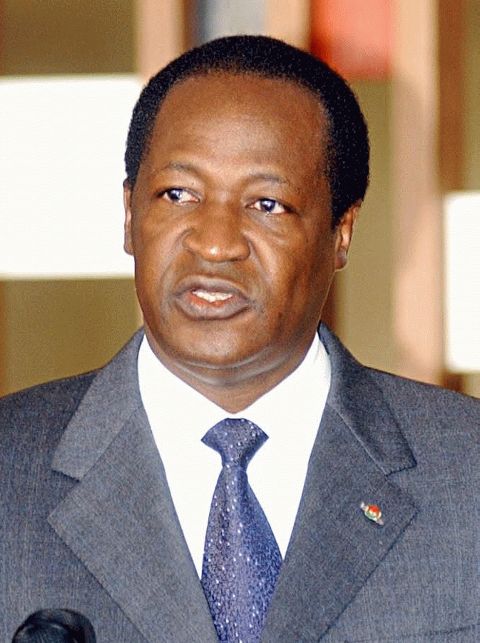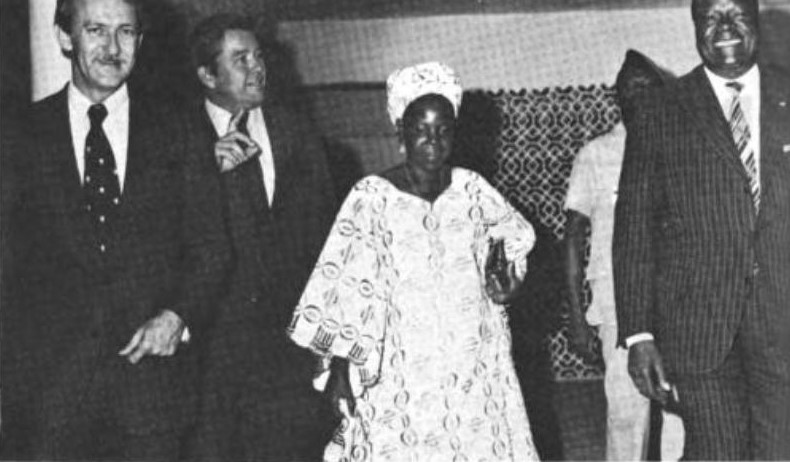|
African Democratic Rally (Burkina Faso)
The African Democratic Rally (''Rassemblement Démocratique Africain'') is a political party in Burkina Faso. It was originally known as the Voltaic Democratic Union-African Democratic Rally (UDV-RDA) and was formed in 1957 as the Voltaic section of the African Democratic Rally (RDA). Soon after Independence in 1960, UDV-RDA became the only legal political party in Upper Volta and a civilian dictatorship was set up. In 1966, there was a military coup to overthrow the government, and the UDV-RDA didn't exist in the new government. Under the rule of Sangoulé Lamizana UDV-RDA was reconstructed and developed good relations with the government. The relation to Lamizana did however cause internal dissent. The pro-Lamizana faction was led by Prime Minister Joseph Conombo and the anti-Lamizana faction was led by Joseph Ouédrago. At the time of the presidential and legislative elections 1978 UDV-RDA had one list for legislative but the different factions supported different president ... [...More Info...] [...Related Items...] OR: [Wikipedia] [Google] [Baidu] |
Ouagadougou
Ouagadougou ( , , ) is the capital and largest city of Burkina Faso and the administrative, communications, cultural, and economic centre of the nation. It is also the country's largest city, with a population of 2,415,266 in 2019. The city's name is often shortened to ''Ouaga''. The inhabitants are called ''ouagalais''. The spelling of the name ''Ouagadougou'' is derived from the French orthography common in former French African colonies. Ouagadougou's primary industries are food processing and textiles. It is served by an international airport and is linked by rail to Abidjan in the Ivory Coast and, for freight only, to Kaya. There are several highways linking the city to Niamey, Niger, south to Ghana, and southwest to Ivory Coast. Ouagadougou has one of West Africa's largest markets, which burned down in 2003 and has since reopened with better facilities and improved fire-prevention measures. Other attractions include the National Museum of Burkina Faso, the Moro-Naba Palac ... [...More Info...] [...Related Items...] OR: [Wikipedia] [Google] [Baidu] |
Joseph Ouédraogo
Joseph Ouédraogo (11 January 1919 – 1988) was a Burkinabè trade unionist and politician, active during the last years of the French Upper Volta and subsequently in the Republic of Upper Volta. Biography Joseph Ouédraogo was born on 11 January 1919 in Saaba, French West Africa. From 1929 to 1933 he received his primary education at the Catholic Mission School of Ouagadougou and before undertaking Secondary studies at the Pabré Undergraduate Seminary from 1933 to 1939. Ouédraogo became a Catholic labor activist and was a member of the Voltaic Union after World War II. In 1954, he was elected Secretary-General of the Catholic ''Union nationale locale des syndicats chrétiens de Haute Volta'', out of which grew the ''Confédération africaine des travailleurs chrétiens'' in 1956, which was renamed the Confédération africaine des travailleurs croyants in 1957 to accommodate non-Catholic workers. He was a member of the Territorial Assembly of Upper Volta from 1952 to 1959 ... [...More Info...] [...Related Items...] OR: [Wikipedia] [Google] [Baidu] |
Pan-Africanist Political Parties In Africa
Pan-Africanism is a worldwide movement that aims to encourage and strengthen bonds of solidarity between all Indigenous and diaspora peoples of African ancestry. Based on a common goal dating back to the Atlantic slave trade, the movement extends beyond continental Africans with a substantial support base among the African diaspora in the Americas and Europe. Pan-Africanism can be said to have its origins in the struggles of the African people against enslavement and colonization and this struggle may be traced back to the first resistance on slave ships—rebellions and suicides—through the constant plantation and colonial uprisings and the "Back to Africa" movements of the 19th century. Based on the belief that unity is vital to economic, social, and political progress and aims to "unify and uplift" people of African ancestry. At its core, pan-Africanism is a belief that "African people, both on the continent and in the diaspora, share not merely a common history, but a c ... [...More Info...] [...Related Items...] OR: [Wikipedia] [Google] [Baidu] |
Pan-Africanism In Burkina Faso
Pan-Africanism is a worldwide movement that aims to encourage and strengthen bonds of solidarity between all Indigenous and diaspora peoples of African ancestry. Based on a common goal dating back to the Atlantic slave trade, the movement extends beyond continental Africans with a substantial support base among the African diaspora in the Americas and Europe. Pan-Africanism can be said to have its origins in the struggles of the African people against enslavement and colonization and this struggle may be traced back to the first resistance on slave ships—rebellions and suicides—through the constant plantation and colonial uprisings and the "Back to Africa" movements of the 19th century. Based on the belief that unity is vital to economic, social, and political progress and aims to "unify and uplift" people of African ancestry. At its core, pan-Africanism is a belief that "African people, both on the continent and in the diaspora, share not merely a common history, but a ... [...More Info...] [...Related Items...] OR: [Wikipedia] [Google] [Baidu] |
1957 Establishments In French Upper Volta
1957 ( MCMLVII) was a common year starting on Tuesday of the Gregorian calendar, the 1957th year of the Common Era (CE) and ''Anno Domini'' (AD) designations, the 957th year of the 2nd millennium, the 57th year of the 20th century, and the 8th year of the 1950s decade. Events January * January 1 – The Saarland joins West Germany. * January 3 – Hamilton Watch Company introduces the first electric watch. * January 5 – South African player Russell Endean becomes the first batsman to be dismissed for having '' handled the ball'', in Test cricket. * January 9 – British Prime Minister Anthony Eden resigns. * January 10 – Harold Macmillan becomes Prime Minister of the United Kingdom. * January 11 – The African Convention is founded in Dakar. * January 14 – Kripalu Maharaj is named fifth Jagadguru (world teacher), after giving seven days of speeches before 500 Hindu scholars. * January 15 – The film ''Throne of Blood'', Akira Kurosawa's reworking of '' Ma ... [...More Info...] [...Related Items...] OR: [Wikipedia] [Google] [Baidu] |
History Of Burkina Faso
The history of Burkina Faso includes the history of various kingdoms within the country, such as the Mossi kingdoms, as well as the later French colonisation of the territory and its independence as the Republic of Upper Volta in 1960. Ancient and medieval history Iron production occurred in regions near Douroula at least as far back as the 8th century BC and was widely practiced across the region by the 5th century BC. Furnaces, mines, and surrounding dwellings dating from this time period are found across the country. Recent archeological discoveries at Bura in southwest Niger and in adjacent southwest Burkina Faso have documented the existence of the iron-age Bura culture from the 3rd century to the 13th century. The Bura-Asinda system of settlements apparently covered the lower Niger River valley, including the Boura region of Burkina Faso. Further research is needed to understand the role this early civilization played in the ancient and medieval history of West Afric ... [...More Info...] [...Related Items...] OR: [Wikipedia] [Google] [Baidu] |
1997 Burkinabé Parliamentary Election
Parliamentary elections were held in Burkina Faso on 11 May 1997, after the National Assembly completed its first full term since independence. The result was a victory for the Congress for Democracy and Progress, which won 101 of the 111 seats in the National Assembly.Elections in Burkina Faso African Elections Database Voter turnout was just 44.1%., Michael Krennerich & Bernhard Thibaut (1999) ''Elections in Africa: A data handbook'', p134 Following the election, the Supreme Court annulled the results in four constituencies. The election was re-run in those wards on 19 June, all of which were won by the CDP. Results References ...[...More Info...] [...Related Items...] OR: [Wikipedia] [Google] [Baidu] |
1992 Burkinabé Parliamentary Election
Parliamentary elections were held in Burkina Faso on 24 May 1992. They were the first parliamentary elections held in the country since 1978, and the first to be held under the 1991 constitution.Burkina Faso The result was a victory for the Organization for Popular Democracy – Labour Movement, which won 78 of the 107 seats in the |
Upper Voltan Parliamentary Election, 1978
Parliamentary elections were held in Upper Volta on 30 April 1978. They followed a constitutional referendum the previous year, which came about as a result of the 1974 military coup. A total of 367 candidates contested the elections.Upper Volta Inter-Parliamentary Union The result was a victory for the Voltaic Democratic Union–African Democratic Rally, which won 28 of the 57 seats in the . Voter turnout was just 38.3%. |
Gérard Kango Ouédraogo
Gérard Kango Ouédraogo (French pronunciation: �eʁaʁ kɑ̃ɡo wedʁaɔɡo September 19, 1925 – July 1, 2014) was a Burkinabé statesman and diplomat who served as Prime Minister of Upper Volta (now Burkina Faso) from 13 February 1971 to 8 February 1974. He was subsequently President of the National Assembly of Upper Volta from October 1978 to November 25, 1980. Overview Gérard Ouédraogo was born in Ouahigouya, Burkina Faso. He served in the French National Assembly from 1956 to 1959. In May 1998,"Histoire de l'ADF-RDA" ADF-RDA website . he was the Honorary President for Life of the Alliance for Democracy and Federation–Afric ... [...More Info...] [...Related Items...] OR: [Wikipedia] [Google] [Baidu] |
Upper Voltan Parliamentary Election, 1970
Parliamentary elections were held in the Republic of Upper Volta on 20 December 1970, following the restoration of multi-party democracy in a referendum earlier in the year. The result was a victory for the former sole legal party, the Voltaic Democratic Union–African Democratic Rally, which won 37 of the 57 seats in the National Assembly In politics, a national assembly is either a unicameral legislature, the lower house of a bicameral legislature, or both houses of a bicameral legislature together. In the English language it generally means "an assembly composed of the repre .... Voter turnout was 48.3%. Inter-Parliamentary Union Results References {{Burkinabe elections[...More Info...] [...Related Items...] OR: [Wikipedia] [Google] [Baidu] |
Upper Voltan Parliamentary Election, 1965
Parliamentary elections were held in the Republic of Upper Volta on 7 November 1965. The country had been a one-party state since 1960, with the Voltaic Democratic Union–African Democratic Rally as the sole legal party. It therefore won all 75 seats in the National Assembly. Voter turnout was 97.4%.Nohlen, D, Krennerich, M & Thibaut, B (1999) ''Elections in Africa: A data handbook'', p133 Results References {{Burkinabe elections Elections in Burkina Faso Burkina Faso Parliamentary election A general election is a political voting election where generally all or most members of a given political body are chosen. These are usually held for a nation, state, or territory's primary legislative body, and are different from by-elections ( ... One-party elections ... [...More Info...] [...Related Items...] OR: [Wikipedia] [Google] [Baidu] |


.jpg)

